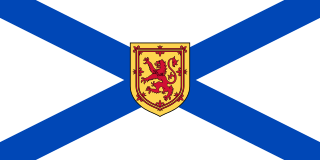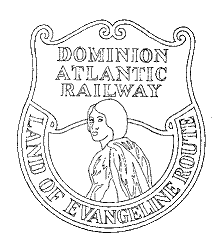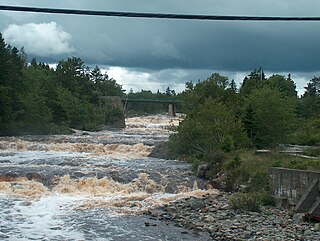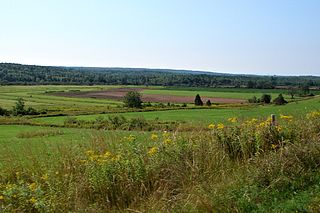
Nova Scotia is a province of Canada, located on its east coast. It is one of the three Maritime provinces.

The Bank of Nova Scotia, operating as Scotiabank, is a Canadian multinational banking and financial services company headquartered in Toronto, Ontario. One of Canada's Big Five banks, it is the third-largest Canadian bank by deposits and market capitalization. In 2023, the company’s seat in Forbes Global 2000 was 88. It serves more than 25 million customers around the world and offers a range of products and services including personal and commercial banking, wealth management, corporate and investment banking. With more than 89,000 employees and assets of CA$1,399 billion as of April 30, 2024, Scotiabank trades on the Toronto and New York exchanges. The Scotiabank swift code is NOSCCATT and the institution number is 002.

Halifax is the capital and most populous municipality of the Canadian province of Nova Scotia, and the most populous municipality in Atlantic Canada. As of 2023, it is estimated that the population of the Halifax CMA was 518,711, with 348,634 people in its urban area. The regional municipality consists of four former municipalities that were amalgamated in 1996: Halifax, Dartmouth, Bedford, and Halifax County.

The Dominion Atlantic Railway was a historic railway which operated in the western part of Nova Scotia in Canada, primarily through an agricultural district known as the Annapolis Valley.

Bedford was a provincial electoral district in Nova Scotia, Canada, that elected one member of the Nova Scotia House of Assembly. Its current Member of the Legislative Assembly is Kelly Regan.

Pellet fuels are a type of solid fuel made from compressed organic material. Pellets can be made from any one of five general categories of biomass: industrial waste and co-products, food waste, agricultural residues, energy crops, and untreated lumber. Wood pellets are the most common type of pellet fuel and are generally made from compacted sawdust and related industrial wastes from the milling of lumber, manufacture of wood products and furniture, and construction. Other industrial waste sources include empty fruit bunches, palm kernel shells, coconut shells, and tree tops and branches discarded during logging operations. So-called "black pellets" are made of biomass, refined to resemble hard coal and were developed to be used in existing coal-fired power plants. Pellets are categorized by their heating value, moisture and ash content, and dimensions. They can be used as fuels for power generation, commercial or residential heating, and cooking.

The Eastern Shore is a region of the Canadian province of Nova Scotia. It is the Atlantic coast running northeast from Halifax Harbour to the eastern end of the peninsula at the Strait of Canso.
The Halifax Regional Municipality (HRM) in Nova Scotia, Canada has a widely varied geography.

Hosting the region's largest urban population, Halifax, Nova Scotia is an important cultural centre in Atlantic Canada. Halifax is home to a vibrant arts and culture community that enjoys considerable support and participation from the general population. As the largest community and the administrative centre of the Atlantic region since its founding in 1749, Halifax has long-standing tradition of being a cultural generator. While provincial arts and culture policies have tended to distribute investment and support of the arts throughout the province, sometimes to the detriment of more populous Halifax, cultural production in the region is increasingly being recognized for its economic benefits, as well as its purely cultural aspects.

The Musquodoboit River is a Canadian river located in central Nova Scotia in the northeastern part of Halifax Regional Municipality. The river is approximately 97 kilometres (60 mi) in length with roughly 88 kilometres (55 mi) being traversable by paddle. It has a watershed area of 1,409 square kilometres (544 sq mi)

The Musquodoboit Valley is a valley and region in the Halifax Regional Municipality of Nova Scotia, Canada. It is administratively located in the municipality's Musquodoboit Valley & Dutch Settlement planning area and the western edge of the valley includes communities that are considered part of the commutershed for the urban area of the Halifax Regional Municipality. The picturesque Musquodoboit River flows through majority of the valley, passing by most of the communities in the valley. The river is approximately 97 kilometres (60 mi) long and originates in the extreme northeastern area of the valley. The three largest communities in the valley are Upper Musquodoboit, Middle Musquodoboit and Musquodoboit Harbour. The word "Musquodoboit" is derived from the Mi’kmaq language and means "rolling out in foam".

The Maritime Life Assurance Company was a Canadian insurance company based in Halifax, Nova Scotia, Canada. It was founded in 1922 and in 2004 it became fully integrated with Manulife Financial, with the Maritime Life brand being retired. In 2004 it had 2700 employees.
Route 224 is a collector road in the Canadian province of Nova Scotia. It is located in the Halifax Regional Municipality and Colchester County, connecting Sheet Harbour at Trunk 7 with Milford Station at Exit 9 of Highway 102 and Trunk 14. The route passes through the upper half of the Musquodoboit Valley.

The 2009 Nova Scotia general election was held on June 9, 2009 to elect members of the 61st House of Assembly of the Province of Nova Scotia, Canada. The government was defeated on a money bill on May 4, and the Nova Scotia House of Assembly was dissolved by Lieutenant Governor Mayann Francis on May 5. thereby triggering an election. The NDP won a majority government, forming government the first time in the province's history, and for the first time in an Atlantic Canadian province. The governing Progressive Conservatives were reduced to third place.
Kenneth Streatch is a farmer and former political figure in Nova Scotia, Canada. He represented Bedford-Musquodoboit Valley and then Colchester-Musquodoboit Valley in the Nova Scotia House of Assembly from 1978 to 1993 as a Progressive Conservative member.

David Scott Armstrong is a Canadian politician, who was elected as a Conservative member to represent the electoral district of Cumberland—Colchester—Musquodoboit Valley in the federal by-elections on November 9, 2009. He served until his defeat in the 2015 election.
The waterside hot water hay pellet furnace is a technology that was developed to convert grass and hay into an energy that can be used in home heating. It's also known as grass pellet heating.
The Bowater Mersey Paper Company Limited, commonly shortened to Bowater Mersey, is a forestry company operating in the Canadian province of Nova Scotia.

West River Sheet Harbour is a river on the Eastern Shore of Nova Scotia, Canada, in the Halifax Regional Municipality. Its headwaters are near the Musquodoboit Valley and the river flows southeast and empties in to the Northwest Arm of Sheet Harbour, Nova Scotia. The river has three main tributaries: West River Main, Killag River and Little River. The river was suffering from acidification, so a lime doser was installed and has been in use since September 2005. It stabilized the river's pH at 5.5, a healthy level for aquatic life.
SaltWire Network Inc. is a Canadian newspaper publishing company owned by Postmedia. Saltwire owns 23 daily and weekly newspapers in Atlantic Canada including The Chronicle Herald in Halifax. The company was formed in 2017 via its purchase of 27 newspapers from Transcontinental.











